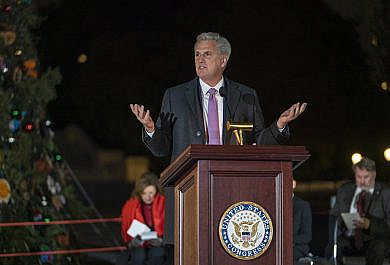The U.S. Senate passed the Respect for Marriage Act, a landmark bill protecting same-sex and interracial marriages, with bipartisan support.
Summary
The U.S. Senate passed the Respect for Marriage Act, a landmark bill protecting same-sex and interracial marriages by a 61-36 margin with support from senators in both parties.
- Twelve Republicans joined all Senate Democrats in support of the measure, which Senate Majority Leader Chuck Schumer said was “a long time coming.” The legislation moves to the House for a final vote, likely next week, and President Joe Biden said he would sign the bill “promptly and proudly” in the likely event that it passes the House.
- The legislation was sponsored by Democrats Tammy Baldwin of Wisconsin and Kyrsten Sinema of Arizona, the first openly lesbian and bisexual senators, respectively. Sens. Rob Portman of Ohio, Susan Collins of Maine, and Thom Tillis of North Carolina were the leading G.O.P. sponsors.
- The bill would require the federal government to recognize marriages that are legal in the state where they are performed and would not prevent states from prohibiting same-sex marriages should the Supreme Court permit them to do so.
- The legislation would officially repeal the 1996 Defense of Marriage Act that defined marriage as only being between a man and a woman before the Supreme Court invalidated the measure as unconstitutional in 2013.
- The bill gained momentum after the Dobbs decision striking down Roe v. Wade. Justice Clarence Thomas’ concurring opinion suggesting the court revisit the 2015 decision legalizing same-sex marriage added new urgency to the campaign to ensure federal protections for same-sex and interracial marriage were codified into federal law.
![]()
- NBC News noted the bill’s passage “reflects the rapidly growing public support for legal same-sex marriage, which hit a new high of 71% in Gallup tracking polls in June, up from just 27% in 1996, when Gallup first began polling the issue.”
- POLITICO charted the “slow, choppy tidal shift” in Republicans’ views on same-sex marriage. Twelve G.O.P. senators and 47 House members endorsed the bill, with support coming from conservatives and moderates alike. “I do feel that the young populations are much more accepting of diverse opinions when it comes to same-sex marriage. And I think this is something that in years to come is not going to be an issue. It shouldn’t be,” said Sen. Joni Ernst, a supporter.
- CNN analyzed the “fine print” of the legislation. The Respect for Marriage Act does not require states to permit same-sex marriage and includes exemptions to protect nonprofit and religious organizations. The bill’s passage is a complete reversal of 1996, when overwhelming bipartisan majorities – including then-Sen. Joe Biden – enacted a federal ban on same-sex marriage.
![]()
- The Wall Street Journal called the bill “the most significant gay-rights measure to pass in the Senate since lawmakers agreed to repeal the U.S. military’s “don’t ask, don’t tell” policy in 2010.” Conservative Sen. Cynthia Lummis of Wyoming justified her support for the measure saying, “We do well by taking this step, not embracing or validating each other’s devoutly held views but by the simple act of tolerating them.”
- National Review urged senators to vote “no” on the Respect for Marriage Act, arguing “the older view of marriage was wiser” than the “flippancy” with which NRO believes too many treat the institution of marriage. NRO argued the only way “to respect both marriage and pluralism” was to vote no.
- The Federalist spun the vote as 12 Republicans working to “help Democrats erode Americans’ right to act on religious convictions about marriage. To make her case, author Jordan Boyd cited a poll of voters in Indiana, Iowa, Utah, West Virginia, and Wyoming to argue that the G.O.P. senators from Ohio, Pennsylvania, Missouri, North Carolina, Maine, and Alaska “disregarded their constituents’ wishes.” Sure, Jan.
© Dominic Moore, 2022






